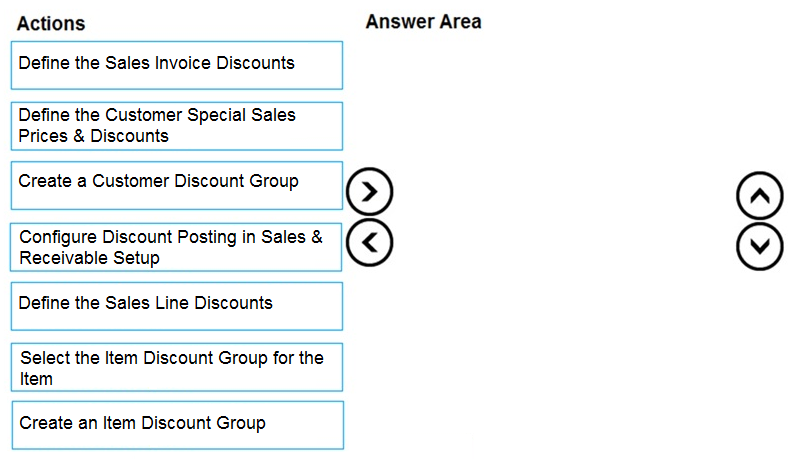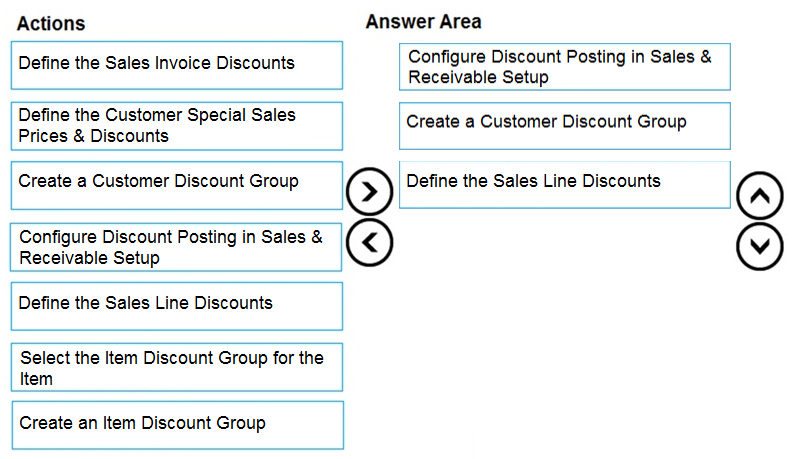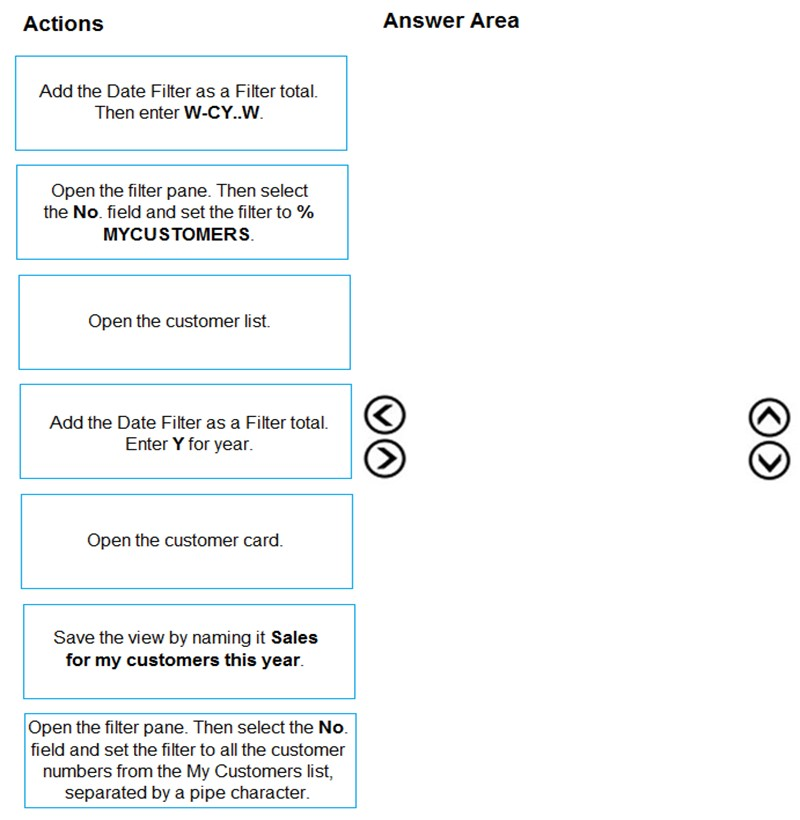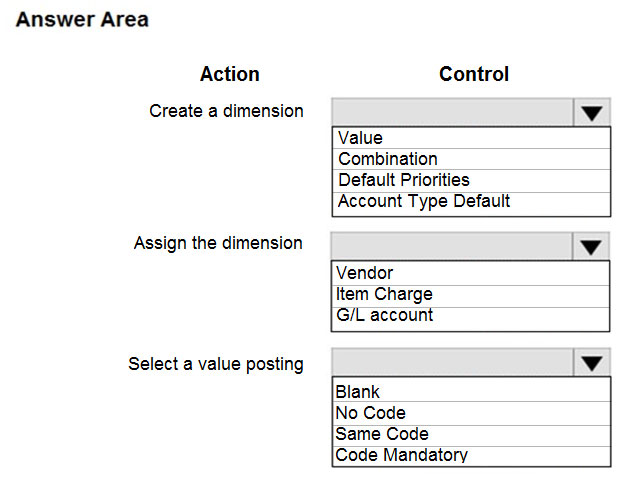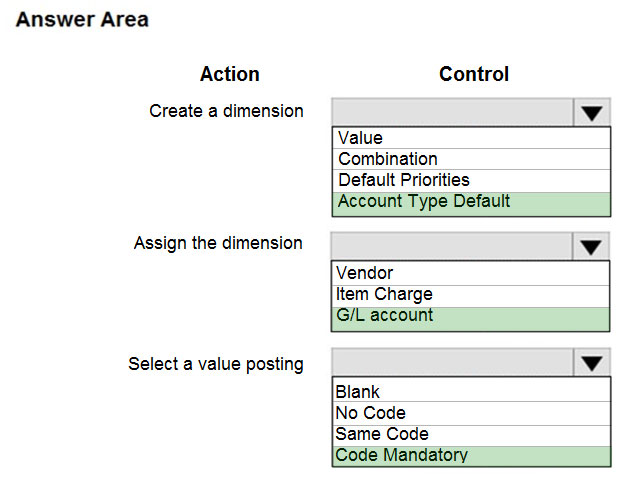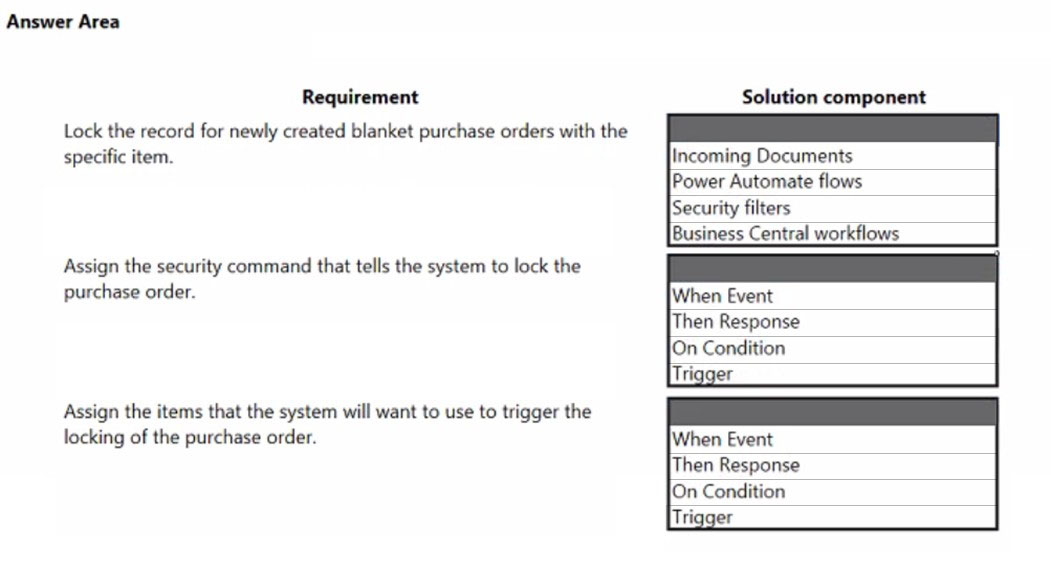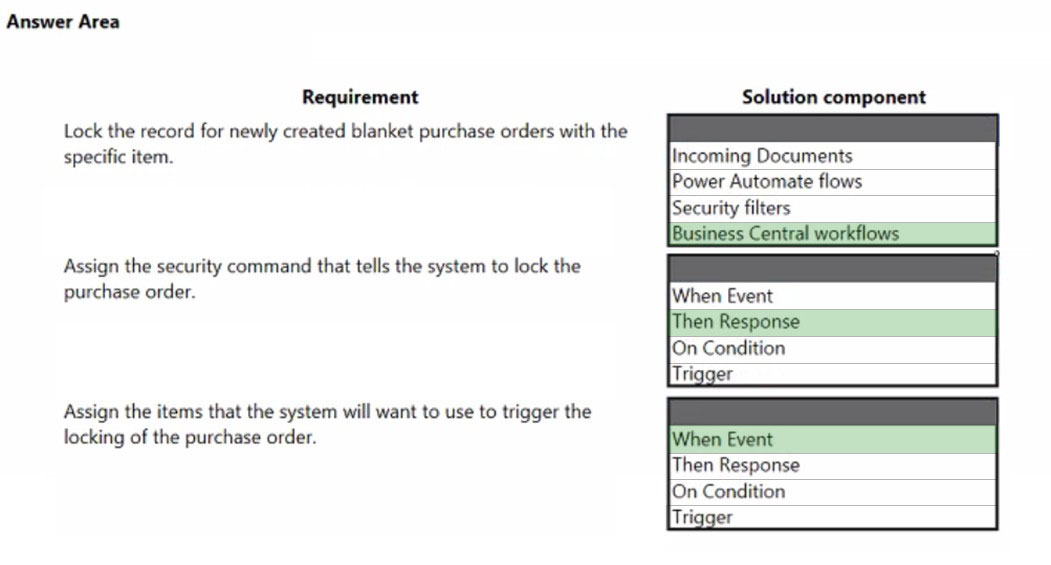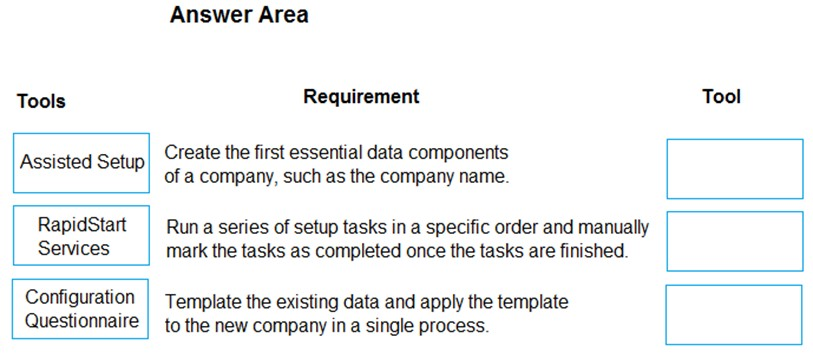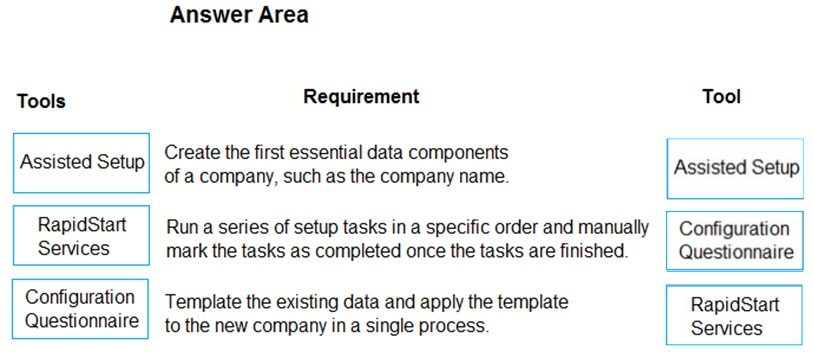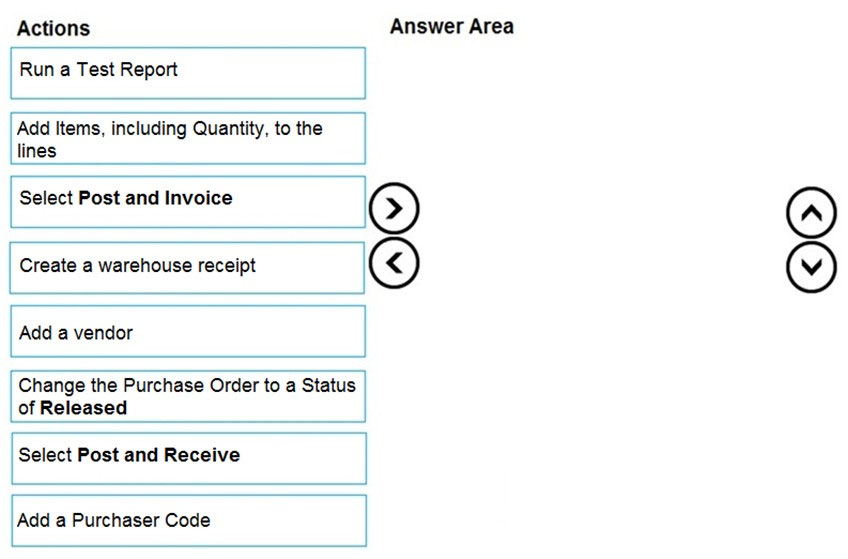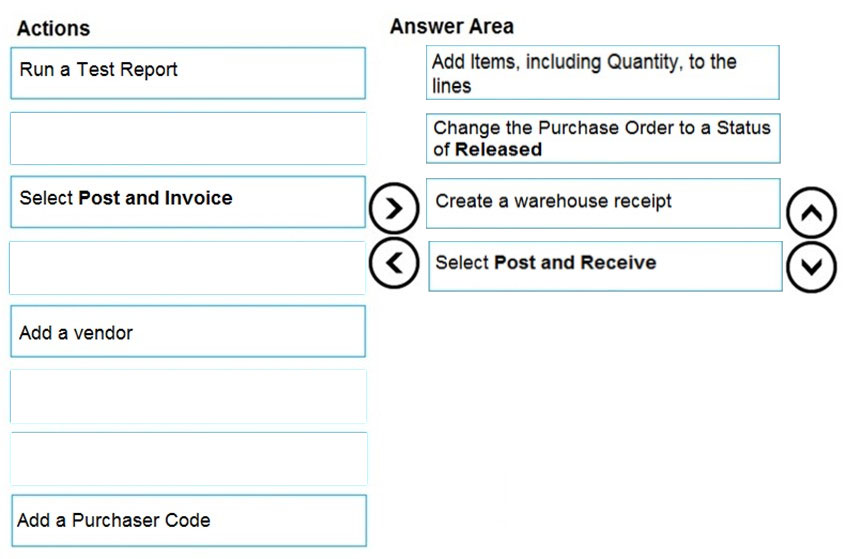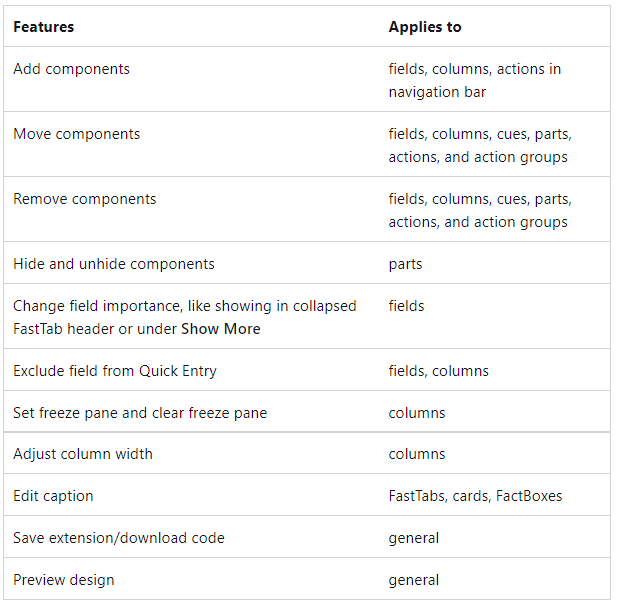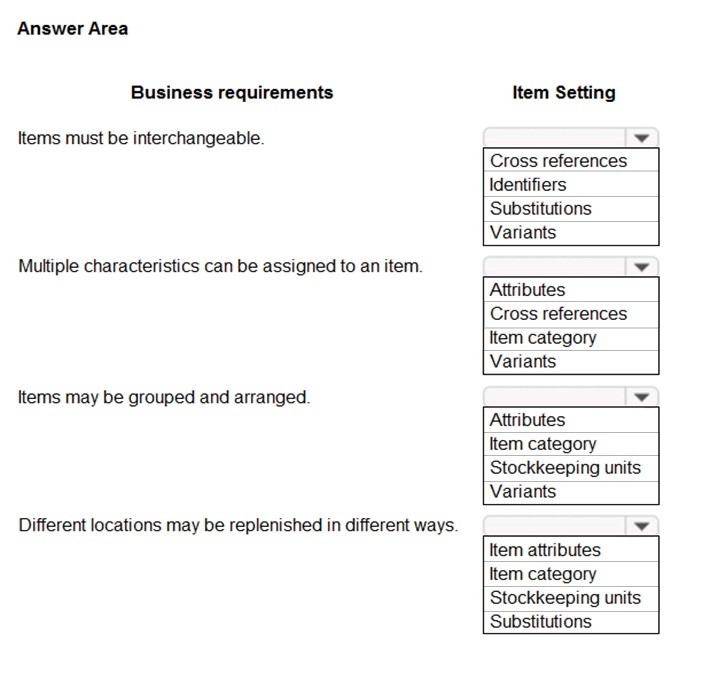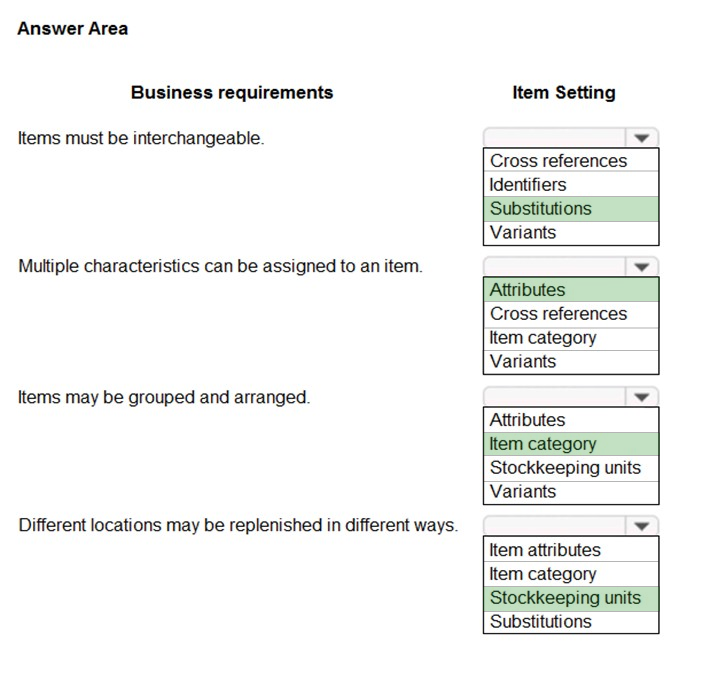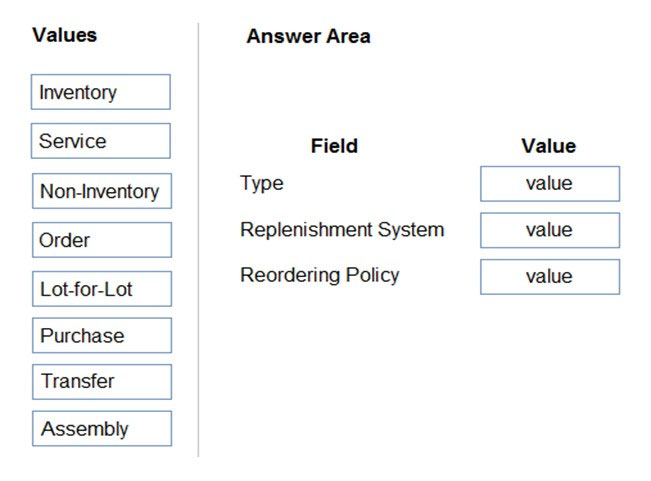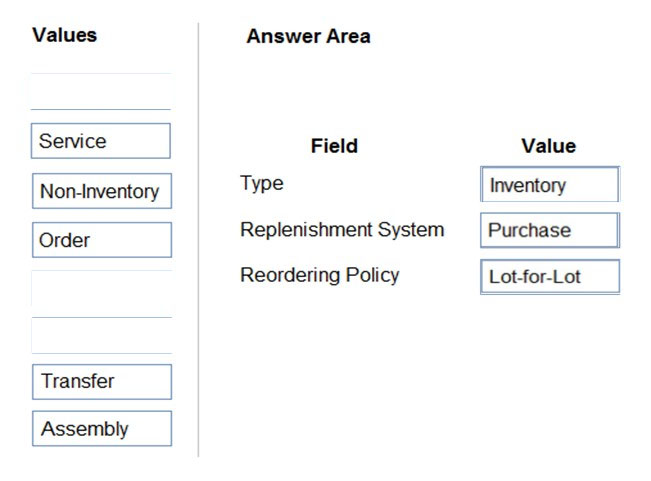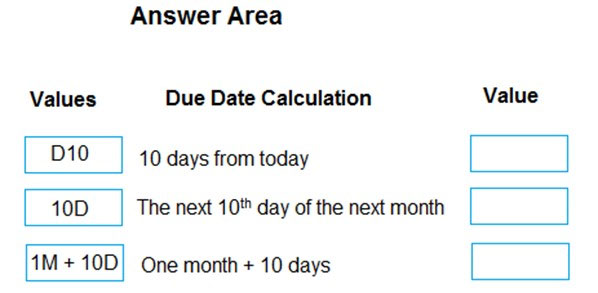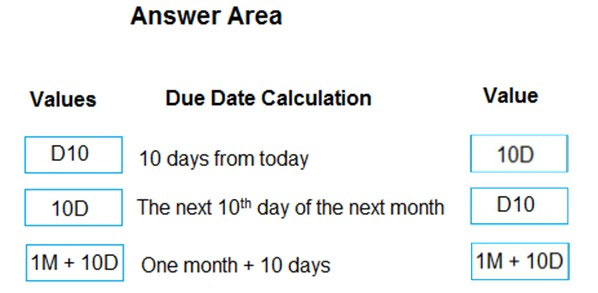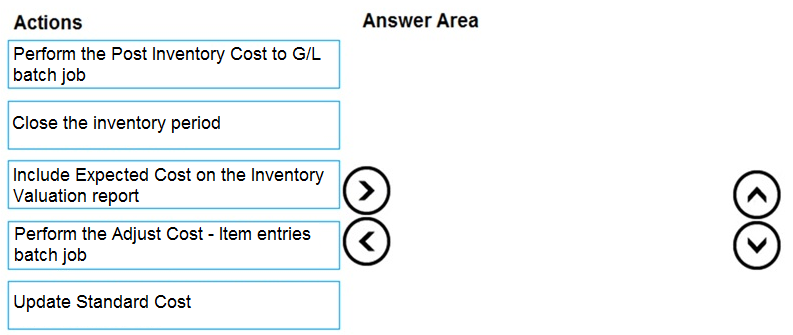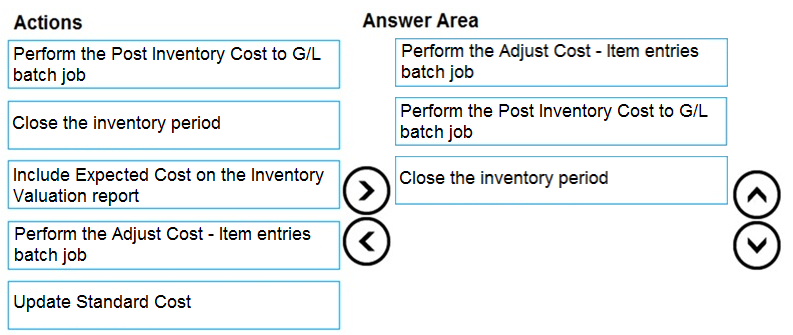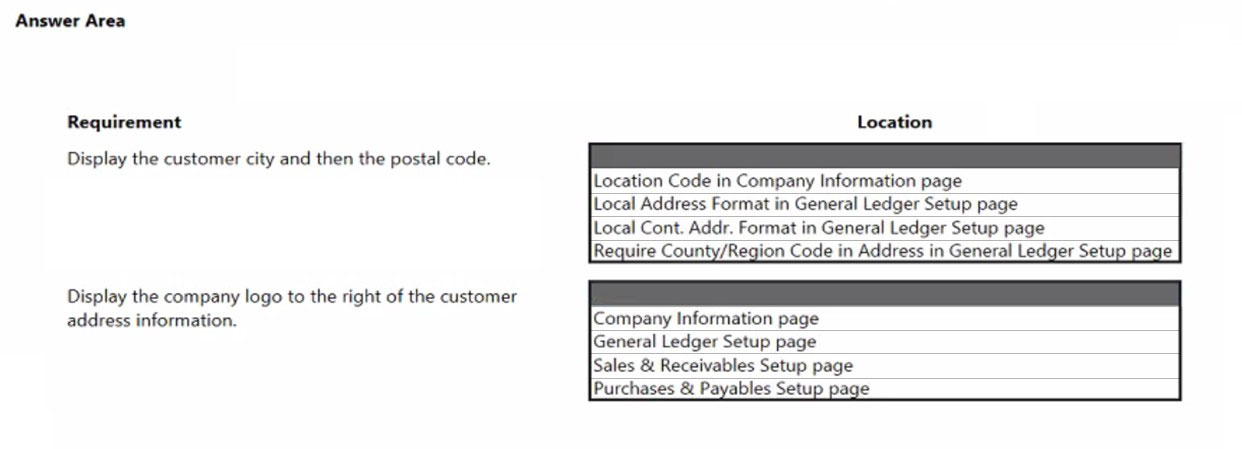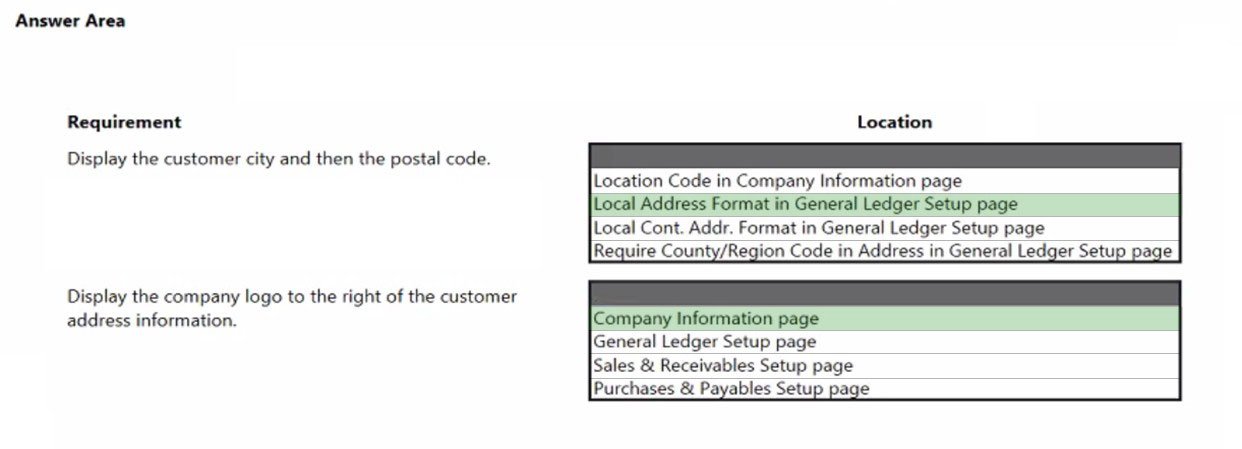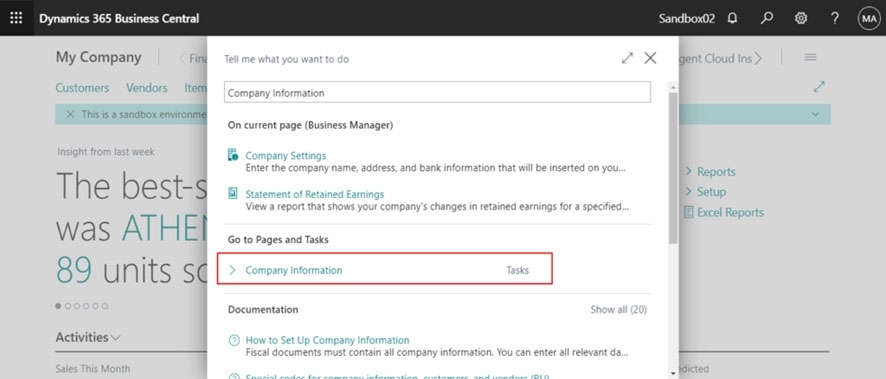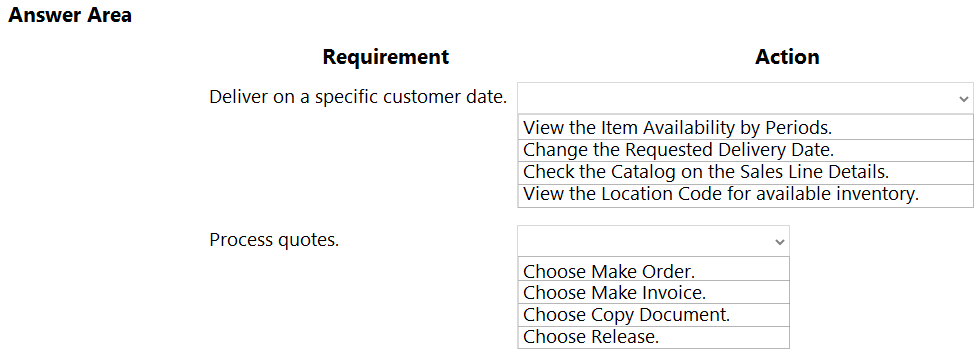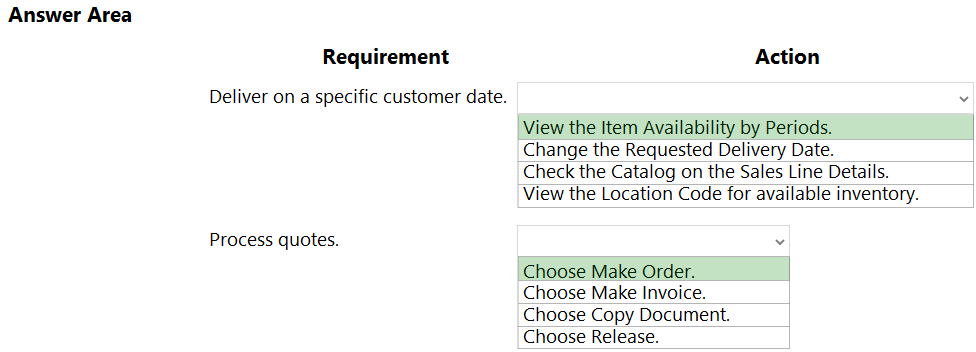MB-800 Practice Test Free – 50 Real Exam Questions to Boost Your Confidence
Preparing for the MB-800 exam? Start with our MB-800 Practice Test Free – a set of 50 high-quality, exam-style questions crafted to help you assess your knowledge and improve your chances of passing on the first try.
Taking a MB-800 practice test free is one of the smartest ways to:
- Get familiar with the real exam format and question types
- Evaluate your strengths and spot knowledge gaps
- Gain the confidence you need to succeed on exam day
Below, you will find 50 free MB-800 practice questions to help you prepare for the exam. These questions are designed to reflect the real exam structure and difficulty level. You can click on each Question to explore the details.
Case study - This is a case study. Case studies are not timed separately. You can use as much exam time as you would like to complete each case. However, there may be additional case studies and sections on this exam. You must manage your time to ensure that you are able to complete all questions included on this exam in the time provided. To answer the questions included in a case study, you will need to reference information that is provided in the case study. Case studies might contain exhibits and other resources that provide more information about the scenario that is described in the case study. Each question is independent of the other questions in this case study. At the end of this case study, a review screen will appear. This screen allows you to review your answers and to make changes before you move to the next section of the exam. After you begin a new section, you cannot return to this section. To start the case study - To display the first question in this case study, click the Next button. Use the buttons in the left pane to explore the content of the case study before you answer the questions. Clicking these buttons displays information such as business requirements, existing environment, and problem statements. If the case study has an All Information tab, note that the information displayed is identical to the information displayed on the subsequent tabs. When you are ready to answer a question, click the Question button to return to the question. Background - Northwind Traders is an independent, family-owned business. The company distributes natural pet products in the Northwest region of the country/region. Products are purchased directly from manufacturers and distributed by using its own fleet of trucks. When the company started, deliveries were within a three-hour radius of the warehouse. Due to regional growth, current deliveries require drivers to stay overnight on some routes. The company plans to open a second warehouse to expand the region and eliminate overnights for route drivers. The company also plans to hire a second group of employees to run operations in this new location. The finance and accounting teams will remain in the original location. The company uses a third-party system for financials and order management. The finance department stated that the company’s fiscal year begins on July 1 and ends on June 30. The mm/dd/yyyy date format is used. As part of the expansion, the owner plans to upgrade to an ERP system and use Business Central to fulfill the company requirements and manage growth. Current environment - Orders - • Orders are emailed to customer service and manually keyed into the inventory system. Pricing and discounts - • Customer pricing is determined by the customer market type. Customer market types are Retail, Veterinarian, and Breeder. Each customer is associated with only one market type. • Vendors offer monthly promotions to customers by item, brand, or item category. • Invoices should show each customer’s base price, the discount amount, and the net price. Accounts payable - • The company wants to expand vendor payment options in the new system. Requirement - Customers - • The sales team must be able to do the following: o Quickly set up new customers with the proper settings based on customer type. o Identify customers by market type. Customer posting groups will be used to identify which market the customer belongs to. • Base price is determined by the customer market type. • The sales department should receive a warning when entering the order if a customer is over their credit limit. Sales - • Customer discounts are offered for specific time frames by item, brand, or product category. Discounts should be added to sales lines automatically. • Discounts must post to a unique general ledger (G/L) account. • The business needs to be able to track revenue by location, market, and product category dimensions. Locations 100 and 200 will be set as default dimensions on the two warehouse locations. Food, treats, toys, and supplies are the required product categories, which will be set as default dimensions on the item cards. Each customer card will have a default market dimension. • The sales manager wants to delete canceled orders and automatically archive them. Warehouse - • Orders will be fulfilled from two possible warehouse locations. • Product will be transferred between locations by using transfer orders. Sales invoices - • Invoices will be posted after delivery. • Invoices will be emailed to the customer. • The sales department must be able to quickly correct posted invoices for the following scenarios: o Posted invoices that have not been paid. o Posted invoices that have been paid. o Posted invoices created from sales orders. o Posted invoices not created from sales orders. Accounting - • The finance department requires that the company has 12 monthly accounting periods per fiscal year. • Finance department users must be able to reconcile the accounts receivable (AR) subledger to the G/L account at month end. • AR department users need the ability to settle and close invoices when customers take payment discounts after the payment discount date has passed. AR users should be allowed to accept or reject the payment tolerance. • Accounts payable (AP) department users must be able to pay vendors by electronic funds transfer (EFT) and use a payment journal batch named EFT to process payments. • When viewing G/L entries, the finance and accounting teams must be able to see debits and credits instead of a positive or negative amount. • The company needs to be able to track expenses by department and location. The departments are sales, operations, and administration. • AR must be able to correct cash application entries. Issues - Payment application - • Customers may have several stores that are responsible for their own orders and payments. • Occasionally, AR clerks mistakenly apply payments to the incorrect customer invoice. Invoicing - • When items are delivered, customers refuse the items for reasons such as damaged or wrong item. • After the invoices are posted, they must be corrected, which is time-consuming. Warehouse - • The sales department and warehouse managers must have visibility into products that are in the process of being transferred between locations. Accounts - • Customer accounts are difficult to view by market type. • The finance team does not have the ability to report revenue by customer type. Accounting - • AR users often find variances between the AR subledger and G/L account. • Customers often take the payment discount after the payment discount date has passed, leaving open invoices for small amounts. • The AP department is unable to pay vendors by EFT in the current system. • Finance and accounting team members have trouble validating postings when they use only the amounts field on G/L entries. • The finance department is unable to run financial reports by market. All revenue postings must reference a market. You need to resolve the issue reported by the AR users from the finance department. What should you do?
A. Switch Blocked on the Customer Card to Yes.
B. Switch Direct Posting on the G/L Account Card to No.
C. Switch Blocked on the G/L Account Card to Yes.
D. Switch Direct Posting on the G/L Account Card to Yes.
DRAG DROP - You need to configure discounting for sales. Which three actions should you perform in sequence? To answer, move the appropriate actions from the list of actions to the answer area. Select and Place:
DRAG DROP - A company plans to set up an approval process for purchase orders in Business Central. The approval process must automatically send out an approval request as soon as a purchase order is created. Purchase orders that require approval must be for an amount of $600 or more. You need to configure the approval workflows. Which areas should you configure for each use case? To answer, drag the appropriate areas to the correct use cases. Each area may be used once, more than once, or not at all. You may need to drag the split bar between panes or scroll to view content. NOTE: Each correct selection is worth one point.
DRAG DROP - You are configuring Dynamics 365 Business Central for a company. You need to create items. Which item types should you use? To answer, drag the appropriate item types to the correct scenarios. Each item type may be used once, more than once, or not at all. You may need to drag the split bar between panes or scroll to view content. NOTE: Each correct selection is worth one point. Select and Place:
DRAG DROP - You are setting up a new company for a customer. The customer wants you to filter the view to show all customers in the My Customers list and calculate the year-to-date sales. You need to apply the filter. Which four actions should you perform in sequence? To answer, move the appropriate entities from the list of actions to the answer area and arrange them in the correct order. NOTE: More than one order of answer choices is correct. You will receive credit for any of the correct orders you select. Select and Place:
You need to set up units of measure for an item to meet the requirements. What are two possible ways to achieve the goal? Each correct answer presents a complete solution. NOTE: Each correct selection is worth one point.
A. Set a Unit of Measure for case to a Qty. of 10.
B. Set a Qty. per Unit of Measure to 1 in the Item Units of Measure table.
C. Set a Unit of Measure for case to a Qty. of 1.
D. Add a Code and Description to the Units of Measure table.
HOTSPOT - You need to report profitability by business line. How should you configure the system? To answer, select the appropriate options in the answer area. NOTE: Each correct selection is worth one point. Hot Area:
HOTSPOT - A company creates blanket purchase orders from inbound documents that are sent to Dynamics 365 Business Central by purchasing agents. When a new blanket purchase order is created with a certain item, the system must send a procurement supervisor a request to approve the purchase order. Purchase orders must not be posted until the procurement supervisor approves the purchase order. You need to configure the system. To answer, select the appropriate options in the answer area NOTE: Each correct selection is worth one point. Hot Area:
DRAG DROP - A company is implementing Dynamics 365 Business Central. You need to create a new company that is configured similarly to an existing company. The existing company has data that must be used as a template for the new company. Which tools should you use? To answer, drag the appropriate tools to the correct requirements. Each tool may be used once, more than once, or not at all. You may need to drag the split bar between panes or scroll to view content. NOTE: Each correct selection is worth one point. Select and Place:
DRAG DROP - You need to configure the purchase order process for the company. Which four actions should you perform in sequence? To answer, move the appropriate actions from the list of actions to the answer area and arrange them in the correct order. Select and Place:
DRAG DROP - A company is replacing their current solution with Dynamics 365 Business Central. During the user acceptance testing, you identify several gaps in the solution. You must add new functionality to the accounts receivable role center to allow order entry clerks to view the number of sales orders that they have created for the month to date. Clerks must be able to move the new role center element to another position on their interface. Accounts receivable clerks each have a specific order in which they enter sales order data. You must optimize the order entry process for these users. You need to configure the system. Which features should you use? To answer, drag the appropriate features to the correct requirements. Each feature may be used once, more than once, or not at all. You may need to drag the split bar between panes or scroll to view content. NOTE: Each correct selection is worth one point. Select and Place:
HOTSPOT - You create a new item in Microsoft Dynamics 365 Business Central. You need to configure item settings. Which item settings should you use? To answer, select the appropriate options in the answer area. NOTE: Each correct selection is worth one point. Hot Area:
DRAG DROP - A company uses Dynamics 365 Business Central. You need to configure the system for new customers. Which features should you use? To answer, drag the appropriate features to the correct requirements. Each feature may be used once, more than once, or not at all. You may need to drag the split bar between panes or scroll to view content. NOTE: Each correct selection is worth one point. Select and Place:
A company is negotiating with a vendor for better prices on several items. The company has made late payments to the vendor in the past. You need to configure the system to help ensure that all future payments will be made on time. What should you do?
A. Set the vendor’s Priority field to 0 and create a workflow for generating vendor payments.
B. Set the vendor’s Priority field to 1 and enable the Late Payment Predictions extension.
C. Set the vendor’s Priority field to 1 and run the Suggest Vendor Payments process.
D. Set the Application Method to Apply to Oldest and run the Suggest Vendor Payments process.
E. Set the vendor’s Priority field to 0 and run the Suggest Vendor Payments process.
DRAG DROP - You are setting up a new item in Dynamics 365 Business Central. The item is a tangible good with an inventory asset value. The item is acquired by purchase specifically for each new instance of demand from an order. You need to configure the Type, Replenishment System, and Reordering Policy fields on the item card to achieve the stated requirements. How should you configure each field? To answer, drag the appropriate values to the correct fields. Each value may be used once, more than once, or not at all. You may need to drag the split bar between panes or scroll to view content. NOTE: Each correct selection is worth one point. Select and Place:
A company is using Dynamics 365 Business Central. The finance manager creates a new general ledger (G/L) account. You need to configure the system to include the G/L account in the general journal reconciliation window. What should you do?
A. Add this G/L account to the Bank Account Posting Group.
B. Enable the Direct Posting field in the G/L account card.
C. Enable the Reconciliation Account field in the G/L account card.
D. Create a new payment reconciliation journal.
HOTSPOT - A company uses Dynamics 365 Business Central. The purchasing department needs to use over-receipts in the system. You need to describe how to set up this functionality. What should you use? To answer, select the appropriate options in the answer area, NOTE: Each correct selection is worth one point.
DRAG DROP - A company uses Dynamics 365 Business Central. You need to configure payment terms with the correct due date calculation formula. What should you do? To answer, drag the appropriate values to the correct requirements. Each value may be used once, more than once, or not at all. You may need to drag the split bar between panes or scroll to view content. NOTE: Each correct selection is worth one point. Select and Place:
DRAG DROP - You set up a new company for a client. The client provides you with a Microsoft Excel file that contains master data for vendors and vendor bank accounts details. You need to import vendor master data and relevant bank account details by using a configuration package. Which four actions should you perform in sequence? To answer, move the appropriate actions from the list of actions to the answer area and arrange them in the correct order.
DRAG DROP - You are implementing Dynamics 365 Business Central for a client. You need to ensure that the user interface (UI) meets the client’s requirements. Which approach should you use? To answer, drag the appropriate approaches to the correct requirements. Each approach may be used once, more than once, or not at all. You may need to drag the split bar between panes or scroll to view content. NOTE: Each correct selection is worth one point.
A company uses Dynamics 365 Business Central. The finance manager requires a rule that prevents application of the payment to the sales invoice if a user sells to a customer in one currency but receives payment in a different currency. You need to set up the rule for the currency application. Which page should you configure?
A. Sales & Receivables Setup
B. General Ledger Setup
C. Customer Card
D. Bank Account Card
E. Currencies
DRAG DROP - A company uses Dynamics 365 Business Central. You need to duplicate a company based on the existing Dynamics 365 Business Central company. Which four actions should you perform in sequence? To answer, move the appropriate actions from the list of actions to the answer area and arrange them in the correct order.
You need to configure the system to meet the requirements for received items. What should you do?
A. Set the default costing method to Standard
B. Turn on Automatic Cost Posting
C. Turn on Expected Cost Posting
D. Set the value of the Automatic Cost Adjustment option to Always
HOTSPOT - A company uses Dynamics 365 Business Central. You are creating a general ledger (G/L) for a checking account in the chart of accounts. You need to populate the fields on the G/L account card. Which value should you select? To answer, select the appropriate options in the answer area. NOTE: Each correct selection is worth one point.
A company uses Dynamics 365 Business Central. You manage customer master data for the company. You need to create new customers. What are three possible ways to achieve the goal? Each correct answer presents a complete solution. NOTE: Each correct selection is worth one point.
A. On the Contacts page, select Related Information and then select Customer.
B. On the Contacts page, select Create as Customer.
C. On the Configuration Template Header for the customer table, select Create Instance.
D. On the Customers page, select New.
E. On the Customer card, select Apply Template.
DRAG DROP - You are implementing Dynamics 365 Business Central for a company. The company must perform inventory valuation according to the following business rules: ✑ Include received items that are not yet invoiced on balance sheets. ✑ Lock inventory value by closing the month. You need to recommend a process for the company's accounting department to use. Which three actions should you recommend be performed in sequence? To answer, move the appropriate actions from the list of actions to the answer area and arrange them in the correct order. Select and Place:
A company configures special prices for a combination of an item number and a vendor. You need to configure optional criteria for special pricing to calculate the best price for the combination. Which three criteria should you use? Each correct answer presents a complete solution. NOTE: Each correct selection is worth one point.
A. Purchasing Code
B. Minimum Quantity
C. Unit of Measure Code
D. Currency Code
E. Line Discount Percentage
You are setting up Dynamics 365 Business Central. You need to define the Direct Cost Applied account. Where should you define the accounts for Direct Cost Applied?
A. Item Cards
B. Inventory Posting Setup
C. General Posting Setups
D. Vendor Posting Groups
HOTSPOT - A company uses Dynamics 365 Business Central. You need to customize sales invoice printouts to meet the following requirements: ✑ Display the customer city and then the postal code. ✑ Display the company logo to the right of the customer address information. Where should you make the configuration change? To answer, select the appropriate options in the answer area. NOTE: Each correct selection is worth one point. Hot Area:
A company recently implemented Business Central. The company uses Teams extensively for day-to-day collaboration. The company finance manager must be able to search for contacts and share Business Central records in Teams. You need to install the Business Central app in Teams. What should you do first?
A. Select the Share action on Attachment Documents in Business Central.
B. Search for Teams App Centralized Deployment in Business Central.
C. Add a Planner tab to a team channel.
D. Manage apps in the Business Central admin center.
A company uses Dynamics 365 Business Central. An accountant must post sales services in a journal by using a predefined alphanumeric sequence. The accountant is using multiple general journal batches. You need to configure invoice numbers for the journal. Which two fields should you populate? Each correct answer presents part of the solution. NOTE: Each correct selection is worth one point.
A. Posting No. Series field in General Journal Templates
B. No. Series field in General Journal Batches
C. No. Series field in General Journal Templates
D. Posting No. Series field in General Journal Batches
A company implements Dynamics 365 Business Central. The company plans to automatically post inventory-related documents simultaneously when posting sales transactions. You need to configure sales and receivables. Which two settings should you use? Each correct answer presents a complete solution. NOTE: Each correct selection is worth one point.
A. Return Receipt on Credit Memo
B. Stock warning
C. Document Default Line Type
D. Shipment on Invoice
HOTSPOT - A company uses Dynamics 365 Business Central. There are three departments (ADM, PROD and SALES) that are set up as dimensions. A customer wants to speed up the purchase invoice entry process for building materials by having the AP clerks fill purchase invoices without using dimensions. Monthly building expenses can vary between $5,000-$7,000 per month. The allocation of building expenses is as follows:Allocation of the monthly building expense between dimensions is required at the end of each month. You need to configure the system to automatically allocate building expense total balances each month between dimensions. How should you configure recurring general journals? To answer, select the appropriate options in the answer area. NOTE: Each correct selection is worth one point.
Case study - This is a case study. Case studies are not timed separately. You can use as much exam time as you would like to complete each case. However, there may be additional case studies and sections on this exam. You must manage your time to ensure that you are able to complete all questions included on this exam in the time provided. To answer the questions included in a case study, you will need to reference information that is provided in the case study. Case studies might contain exhibits and other resources that provide more information about the scenario that is described in the case study. Each question is independent of the other questions in this case study. At the end of this case study, a review screen will appear. This screen allows you to review your answers and to make changes before you move to the next section of the exam. After you begin a new section, you cannot return to this section. To start the case study - To display the first question in this case study, click the Next button. Use the buttons in the left pane to explore the content of the case study before you answer the questions. Clicking these buttons displays information such as business requirements, existing environment, and problem statements. If the case study has an All Information tab, note that the information displayed is identical to the information displayed on the subsequent tabs. When you are ready to answer a question, click the Question button to return to the question. Background - Northwind Traders is an independent, family-owned business. The company distributes natural pet products in the Northwest region of the country/region. Products are purchased directly from manufacturers and distributed by using its own fleet of trucks. When the company started, deliveries were within a three-hour radius of the warehouse. Due to regional growth, current deliveries require drivers to stay overnight on some routes. The company plans to open a second warehouse to expand the region and eliminate overnights for route drivers. The company also plans to hire a second group of employees to run operations in this new location. The finance and accounting teams will remain in the original location. The company uses a third-party system for financials and order management. The finance department stated that the company’s fiscal year begins on July 1 and ends on June 30. The mm/dd/yyyy date format is used. As part of the expansion, the owner plans to upgrade to an ERP system and use Business Central to fulfill the company requirements and manage growth. Current environment - Orders - • Orders are emailed to customer service and manually keyed into the inventory system. Pricing and discounts - • Customer pricing is determined by the customer market type. Customer market types are Retail, Veterinarian, and Breeder. Each customer is associated with only one market type. • Vendors offer monthly promotions to customers by item, brand, or item category. • Invoices should show each customer’s base price, the discount amount, and the net price. Accounts payable - • The company wants to expand vendor payment options in the new system. Requirement - Customers - • The sales team must be able to do the following: o Quickly set up new customers with the proper settings based on customer type. o Identify customers by market type. Customer posting groups will be used to identify which market the customer belongs to. • Base price is determined by the customer market type. • The sales department should receive a warning when entering the order if a customer is over their credit limit. Sales - • Customer discounts are offered for specific time frames by item, brand, or product category. Discounts should be added to sales lines automatically. • Discounts must post to a unique general ledger (G/L) account. • The business needs to be able to track revenue by location, market, and product category dimensions. Locations 100 and 200 will be set as default dimensions on the two warehouse locations. Food, treats, toys, and supplies are the required product categories, which will be set as default dimensions on the item cards. Each customer card will have a default market dimension. • The sales manager wants to delete canceled orders and automatically archive them. Warehouse - • Orders will be fulfilled from two possible warehouse locations. • Product will be transferred between locations by using transfer orders. Sales invoices - • Invoices will be posted after delivery. • Invoices will be emailed to the customer. • The sales department must be able to quickly correct posted invoices for the following scenarios: o Posted invoices that have not been paid. o Posted invoices that have been paid. o Posted invoices created from sales orders. o Posted invoices not created from sales orders. Accounting - • The finance department requires that the company has 12 monthly accounting periods per fiscal year. • Finance department users must be able to reconcile the accounts receivable (AR) subledger to the G/L account at month end. • AR department users need the ability to settle and close invoices when customers take payment discounts after the payment discount date has passed. AR users should be allowed to accept or reject the payment tolerance. • Accounts payable (AP) department users must be able to pay vendors by electronic funds transfer (EFT) and use a payment journal batch named EFT to process payments. • When viewing G/L entries, the finance and accounting teams must be able to see debits and credits instead of a positive or negative amount. • The company needs to be able to track expenses by department and location. The departments are sales, operations, and administration. • AR must be able to correct cash application entries. Issues - Payment application - • Customers may have several stores that are responsible for their own orders and payments. • Occasionally, AR clerks mistakenly apply payments to the incorrect customer invoice. Invoicing - • When items are delivered, customers refuse the items for reasons such as damaged or wrong item. • After the invoices are posted, they must be corrected, which is time-consuming. Warehouse - • The sales department and warehouse managers must have visibility into products that are in the process of being transferred between locations. Accounts - • Customer accounts are difficult to view by market type. • The finance team does not have the ability to report revenue by customer type. Accounting - • AR users often find variances between the AR subledger and G/L account. • Customers often take the payment discount after the payment discount date has passed, leaving open invoices for small amounts. • The AP department is unable to pay vendors by EFT in the current system. • Finance and accounting team members have trouble validating postings when they use only the amounts field on G/L entries. • The finance department is unable to run financial reports by market. All revenue postings must reference a market. You need to configure Business Central to display G/L entries as required by the accounting team. Which configuration should you use?
A. Show Amounts
B. Check G/L Account Usage
C. G/L Account Card
D. Debit/Credit
DRAG DROP - A manufacturer uses Dynamics 365 Business Central. The company has the following item types: • Raw Materials • Work-in-progress (WIP) • Finished Goods Different prefixes are used for item numbers to identify these item types. The company requires the following system setup: • Use a unique number series for each item type. • No. Series must be selectable when creating manual items. • Implement automatic number assignment. You need to configure the system. In which order should you perform the actions? To answer, move all actions from the list of actions to the answer area and arrange them in the correct order. NOTE: More than one order of answer choices is correct. You will receive credit for any of the correct orders you select.
DRAG DROP - A company uses Dynamics 365 Business Central. The finance manager requires a specific group of operating team users to have access only to a particular set of customer data. You need to configure and enforce the security requirements. Which pages should you configure? To answer, move the appropriate pages to the correct requirements. You may use each page once, more than once, or not at all. You may need to move the split bar between panes or scroll to view content. NOTE: Each correct selection is worth one point.
DRAG DROP - Case study - This is a case study. Case studies are not timed separately. You can use as much exam time as you would like to complete each case. However, there may be additional case studies and sections on this exam. You must manage your time to ensure that you are able to complete all questions included on this exam in the time provided. To answer the questions included in a case study, you will need to reference information that is provided in the case study. Case studies might contain exhibits and other resources that provide more information about the scenario that is described in the case study. Each question is independent of the other questions in this case study. At the end of this case study, a review screen will appear. This screen allows you to review your answers and to make changes before you move to the next section of the exam. After you begin a new section, you cannot return to this section. To start the case study - To display the first question in this case study, click the Next button. Use the buttons in the left pane to explore the content of the case study before you answer the questions. Clicking these buttons displays information such as business requirements, existing environment, and problem statements. If the case study has an All Information tab, note that the information displayed is identical to the information displayed on the subsequent tabs. When you are ready to answer a question, click the Question button to return to the question. Background - Northwind Traders is an independent, family-owned business. The company distributes natural pet products in the Northwest region of the country/region. Products are purchased directly from manufacturers and distributed by using its own fleet of trucks. When the company started, deliveries were within a three-hour radius of the warehouse. Due to regional growth, current deliveries require drivers to stay overnight on some routes. The company plans to open a second warehouse to expand the region and eliminate overnights for route drivers. The company also plans to hire a second group of employees to run operations in this new location. The finance and accounting teams will remain in the original location. The company uses a third-party system for financials and order management. The finance department stated that the company’s fiscal year begins on July 1 and ends on June 30. The mm/dd/yyyy date format is used. As part of the expansion, the owner plans to upgrade to an ERP system and use Business Central to fulfill the company requirements and manage growth. Current environment - Orders - • Orders are emailed to customer service and manually keyed into the inventory system. Pricing and discounts - • Customer pricing is determined by the customer market type. Customer market types are Retail, Veterinarian, and Breeder. Each customer is associated with only one market type. • Vendors offer monthly promotions to customers by item, brand, or item category. • Invoices should show each customer’s base price, the discount amount, and the net price. Accounts payable - • The company wants to expand vendor payment options in the new system. Requirement - Customers - • The sales team must be able to do the following: o Quickly set up new customers with the proper settings based on customer type. o Identify customers by market type. Customer posting groups will be used to identify which market the customer belongs to. • Base price is determined by the customer market type. • The sales department should receive a warning when entering the order if a customer is over their credit limit. Sales - • Customer discounts are offered for specific time frames by item, brand, or product category. Discounts should be added to sales lines automatically. • Discounts must post to a unique general ledger (G/L) account. • The business needs to be able to track revenue by location, market, and product category dimensions. Locations 100 and 200 will be set as default dimensions on the two warehouse locations. Food, treats, toys, and supplies are the required product categories, which will be set as default dimensions on the item cards. Each customer card will have a default market dimension. • The sales manager wants to delete canceled orders and automatically archive them. Warehouse - • Orders will be fulfilled from two possible warehouse locations. • Product will be transferred between locations by using transfer orders. Sales invoices - • Invoices will be posted after delivery. • Invoices will be emailed to the customer. • The sales department must be able to quickly correct posted invoices for the following scenarios: o Posted invoices that have not been paid. o Posted invoices that have been paid. o Posted invoices created from sales orders. o Posted invoices not created from sales orders. Accounting - • The finance department requires that the company has 12 monthly accounting periods per fiscal year. • Finance department users must be able to reconcile the accounts receivable (AR) subledger to the G/L account at month end. • AR department users need the ability to settle and close invoices when customers take payment discounts after the payment discount date has passed. AR users should be allowed to accept or reject the payment tolerance. • Accounts payable (AP) department users must be able to pay vendors by electronic funds transfer (EFT) and use a payment journal batch named EFT to process payments. • When viewing G/L entries, the finance and accounting teams must be able to see debits and credits instead of a positive or negative amount. • The company needs to be able to track expenses by department and location. The departments are sales, operations, and administration. • AR must be able to correct cash application entries. Issues - Payment application - • Customers may have several stores that are responsible for their own orders and payments. • Occasionally, AR clerks mistakenly apply payments to the incorrect customer invoice. Invoicing - • When items are delivered, customers refuse the items for reasons such as damaged or wrong item. • After the invoices are posted, they must be corrected, which is time-consuming. Warehouse - • The sales department and warehouse managers must have visibility into products that are in the process of being transferred between locations. Accounts - • Customer accounts are difficult to view by market type. • The finance team does not have the ability to report revenue by customer type. Accounting - • AR users often find variances between the AR subledger and G/L account. • Customers often take the payment discount after the payment discount date has passed, leaving open invoices for small amounts. • The AP department is unable to pay vendors by EFT in the current system. • Finance and accounting team members have trouble validating postings when they use only the amounts field on G/L entries. • The finance department is unable to run financial reports by market. All revenue postings must reference a market. You need to train the sales department how to correct posted sales invoices. Which action should you use for each scenario? To answer, drag the appropriate actions to the correct scenarios. Each action may be used once, more than once, or not at all. You may need to drag the split bar between panes or scroll to view content. NOTE: Each correct selection is worth one point.
DRAG DROP - You are implementing Dynamics 365 Business Central. The purchasing manager wants to implement an approval system by using email notifications. You need to set up the notification system. Which setup should you use? To answer, drag the appropriate setup to the correct actions. Each setup may be used once, more than once, or not at all. You may need to drag the split bar between panes or scroll to view content. NOTE: Each correct selection is worth one point. Select and Place:
You need to configure the system to meet the requirements for sending invoices. Which three actions should you perform? Each correct answer presents part of the solution. NOTE: Each correct selection is worth one point.
A. Set Email to Yes (Use Default Settings).
B. Allow Sender Substitution for SMTP Mail Setup.
C. Set Email to Yes (Prompt for Settings).
D. Assign a Document Sending Profile to the Customer where Email is set to No.
E. Apply Office Server Settings to the SMTP Mail Setup.
F. Assign a Document Sending Profile to the Customer where Email is set to Yes.
Two cash receipts were applied to a posted sales transaction. The first receipt was applied in error. You need to remove the first cash receipt from the posted sales transaction. Which set of steps should you perform?
A. 1. Navigate to Unapply Entries from the relevant customer ledger entry. 2. Unapply the second payment. 3. Unapply the first payment. 4. Apply the second payment to the customer ledger entry.
B. 1. Navigate to Reverse Transaction from the relevant detailed customer ledger entry. 2. Reverse the second payment. 3. Reverse the first payment. 4. Apply the second payment to the customer ledger entry.
C. 1. Navigate to Reverse Transaction from the relevant customer ledger entry. 2. Reverse the second payment. 3. Reverse the first payment. 4. Apply the second payment to the customer ledger entry.
D. 1. Post a reversing Cash Receipt and select the customer and relevant payment entry. 2. Navigate to Unapply Entries from the relevant customer ledger entry. 3. Unapply the payment.
A company uses the average costing method and inventory periods. Automatic Cost Posting is not enabled. You close the inventory period for July 2020. You set the value of the Allow Posting From field in General Ledger Setup to August 1, 2020. You receive and post a purchase invoice for freight charges on August 8, 2020 against a purchase invoice that was posted on July 15, 2020. You run the Adjust cost `" Item entries batch job for August. You need to identify the adjustment entry related to July after running the batch job. Which date is automatically selected for the value entry by batch job?
A. July 15, 2020
B. August 8, 2020
C. August 1, 2020
D. July 1, 2020
After you answer a question in this section, you will NOT be able to return to it. As a result, these questions will not appear in the review screen. You need to transfer opening balances data into the system. Solution: Transfer balances by using the Copy Company function. Does the solution meet the goal?
A. Yes
B. No
A company uses Dynamics 365 Business Central. The company wants to print financial statements by using a cloud-based printer. You need to recommend the type of printer the customer should install. Which type of printer should you recommend?
A. Email
B. System
C. Client default
D. Server default
DRAG DROP - You are setting up approval workflows in Dynamics 365 Business Central. You need to configure approver limits. Which approver limit types should you use? To answer, drag the appropriate approver limit types to the correct requirements. Each approver limit type may be used once, or not at all. You may need to drag the split bar between panes or scroll to view content. NOTE: Each correct selection is worth one point. Select and Place:
You are implementing Dynamics 365 Business Central for a company. The accounting manager provides you the chart of accounts. You are setting up the posting groups for the accounting department. You must use a standard costing method and post any differences between actual purchase costs and the standard cost. You need to set up a general ledger account for posting any differences in costs. What should you use?
A. Gen. Business Posting Groups
B. General Posting Setup
C. Vendor Posting Groups
D. Inventory Posting Groups
DRAG DROP - A client uses Dynamics 365 Business Central. The client must create a manufacturing company and a sales company in Business Central. Each company must be a separate legal entity. The client must select a costing method to use. You need to explain the effects of the different costing methods. What should you describe for each costing method? To answer, move the appropriate effect to the correct costing method. You may use each effect once, more than once, or not at all. You may need to drag the split bar between panes or scroll to view content. NOTE: Each correct selection is worth one point.
Case study - This is a case study. Case studies are not timed separately. You can use as much exam time as you would like to complete each case. However, there may be additional case studies and sections on this exam. You must manage your time to ensure that you are able to complete all questions included on this exam in the time provided. To answer the questions included in a case study, you will need to reference information that is provided in the case study. Case studies might contain exhibits and other resources that provide more information about the scenario that is described in the case study. Each question is independent of the other questions in this case study. At the end of this case study, a review screen will appear. This screen allows you to review your answers and to make changes before you move to the next section of the exam. After you begin a new section, you cannot return to this section. To start the case study - To display the first question in this case study, click the Next button. Use the buttons in the left pane to explore the content of the case study before you answer the questions. Clicking these buttons displays information such as business requirements, existing environment, and problem statements. If the case study has an All Information tab, note that the information displayed is identical to the information displayed on the subsequent tabs. When you are ready to answer a question, click the Question button to return to the question. Background - Northwind Traders is an independent, family-owned business. The company distributes natural pet products in the Northwest region of the country/region. Products are purchased directly from manufacturers and distributed by using its own fleet of trucks. When the company started, deliveries were within a three-hour radius of the warehouse. Due to regional growth, current deliveries require drivers to stay overnight on some routes. The company plans to open a second warehouse to expand the region and eliminate overnights for route drivers. The company also plans to hire a second group of employees to run operations in this new location. The finance and accounting teams will remain in the original location. The company uses a third-party system for financials and order management. The finance department stated that the company’s fiscal year begins on July 1 and ends on June 30. The mm/dd/yyyy date format is used. As part of the expansion, the owner plans to upgrade to an ERP system and use Business Central to fulfill the company requirements and manage growth. Current environment - Orders - • Orders are emailed to customer service and manually keyed into the inventory system. Pricing and discounts - • Customer pricing is determined by the customer market type. Customer market types are Retail, Veterinarian, and Breeder. Each customer is associated with only one market type. • Vendors offer monthly promotions to customers by item, brand, or item category. • Invoices should show each customer’s base price, the discount amount, and the net price. Accounts payable - • The company wants to expand vendor payment options in the new system. Requirement - Customers - • The sales team must be able to do the following: o Quickly set up new customers with the proper settings based on customer type. o Identify customers by market type. Customer posting groups will be used to identify which market the customer belongs to. • Base price is determined by the customer market type. • The sales department should receive a warning when entering the order if a customer is over their credit limit. Sales - • Customer discounts are offered for specific time frames by item, brand, or product category. Discounts should be added to sales lines automatically. • Discounts must post to a unique general ledger (G/L) account. • The business needs to be able to track revenue by location, market, and product category dimensions. Locations 100 and 200 will be set as default dimensions on the two warehouse locations. Food, treats, toys, and supplies are the required product categories, which will be set as default dimensions on the item cards. Each customer card will have a default market dimension. • The sales manager wants to delete canceled orders and automatically archive them. Warehouse - • Orders will be fulfilled from two possible warehouse locations. • Product will be transferred between locations by using transfer orders. Sales invoices - • Invoices will be posted after delivery. • Invoices will be emailed to the customer. • The sales department must be able to quickly correct posted invoices for the following scenarios: o Posted invoices that have not been paid. o Posted invoices that have been paid. o Posted invoices created from sales orders. o Posted invoices not created from sales orders. Accounting - • The finance department requires that the company has 12 monthly accounting periods per fiscal year. • Finance department users must be able to reconcile the accounts receivable (AR) subledger to the G/L account at month end. • AR department users need the ability to settle and close invoices when customers take payment discounts after the payment discount date has passed. AR users should be allowed to accept or reject the payment tolerance. • Accounts payable (AP) department users must be able to pay vendors by electronic funds transfer (EFT) and use a payment journal batch named EFT to process payments. • When viewing G/L entries, the finance and accounting teams must be able to see debits and credits instead of a positive or negative amount. • The company needs to be able to track expenses by department and location. The departments are sales, operations, and administration. • AR must be able to correct cash application entries. Issues - Payment application - • Customers may have several stores that are responsible for their own orders and payments. • Occasionally, AR clerks mistakenly apply payments to the incorrect customer invoice. Invoicing - • When items are delivered, customers refuse the items for reasons such as damaged or wrong item. • After the invoices are posted, they must be corrected, which is time-consuming. Warehouse - • The sales department and warehouse managers must have visibility into products that are in the process of being transferred between locations. Accounts - • Customer accounts are difficult to view by market type. • The finance team does not have the ability to report revenue by customer type. Accounting - • AR users often find variances between the AR subledger and G/L account. • Customers often take the payment discount after the payment discount date has passed, leaving open invoices for small amounts. • The AP department is unable to pay vendors by EFT in the current system. • Finance and accounting team members have trouble validating postings when they use only the amounts field on G/L entries. • The finance department is unable to run financial reports by market. All revenue postings must reference a market. You need to configure payment discounts to resolve the issue reported by the AR users. Which two options should you configure? Each correct answer presents part of the solution. NOTE: Each correct selection is worth one point.
A. Sales & Receivables Setup
B. Payment Discount Grace Period
C. Payment Tolerance Warning
D. Pmt. Disc. Tolerance Warning
HOTSPOT - You need to create the process for salespeople. What should you do? To answer, select the appropriate options in the answer area. NOTE: Each correct selection is worth one point. Hot Area:
After you answer a question in this section, you will NOT be able to return to it. As a result, these questions will not appear in the review screen. You must streamline monthly invoicing by automating repetitive entries for monthly charges when managing subscriptions. You need to add default general ledger (GL) accounts to a Customer Card. Solution: Configure a Standard Purchase Code Card and assign it to a Vendor Card. Does the solution meet the goal?
A. Yes
B. No
A company uses Dynamics 365 Business Central for their receivables. The company wants to mark any automatically matched payments to open invoices as not requiring a review if they match the highest degree of confidence that the two transactions are a match. You need to configure payment matching rules. Which three criteria should you configure? Each correct answer presents part of the solution. NOTE: Each correct selection is worth one point.
A. Statement amount
B. Account number
C. Related-party fields
D. Transaction date
E. Transaction text
Free Access Full MB-800 Practice Test Free Questions
If you’re looking for more MB-800 practice test free questions, click here to access the full MB-800 practice test.
We regularly update this page with new practice questions, so be sure to check back frequently.
Good luck with your MB-800 certification journey!


